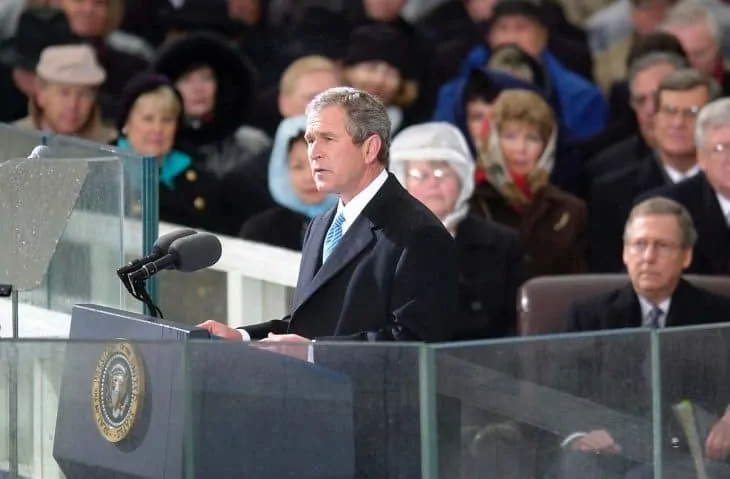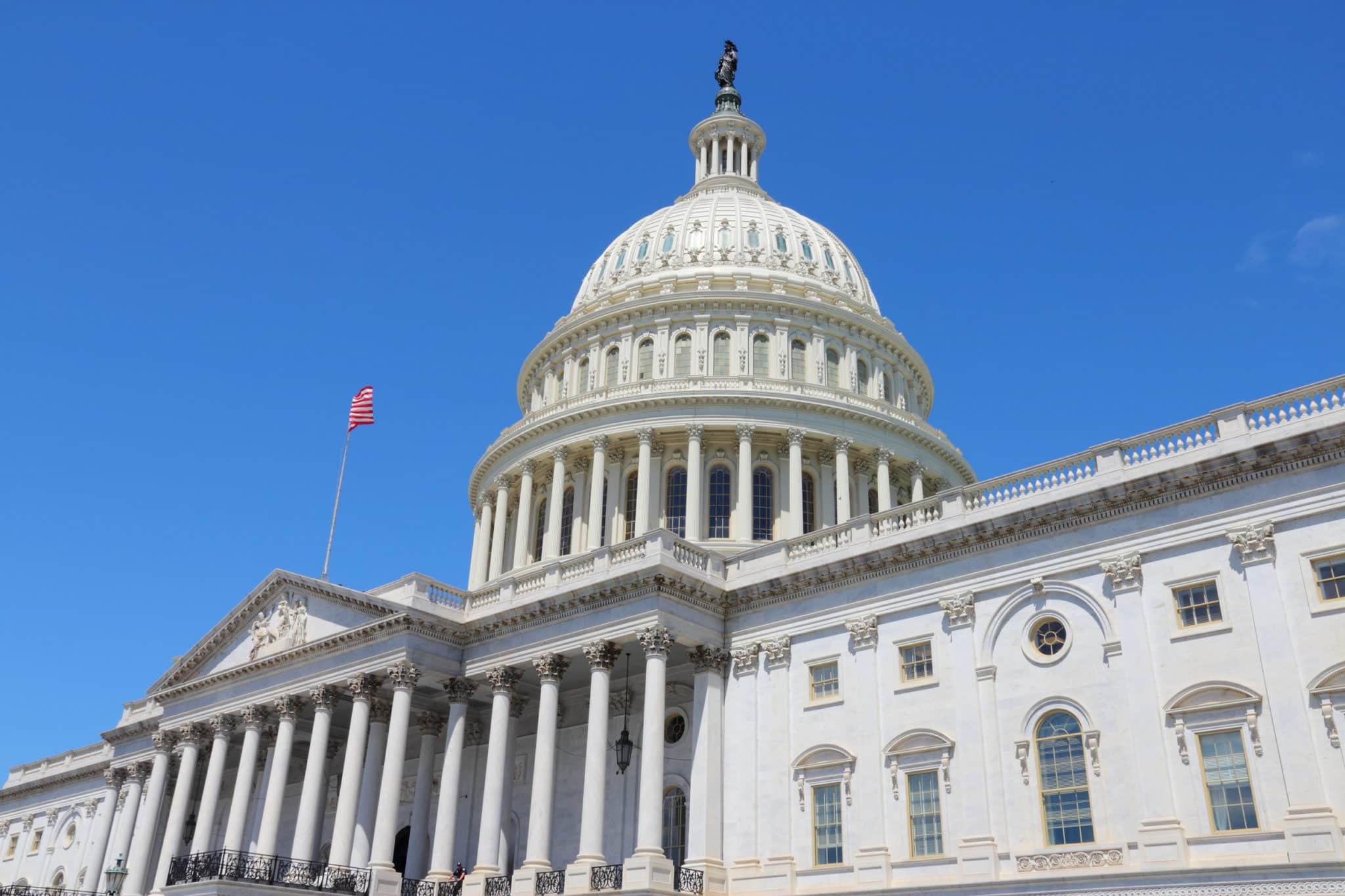
Aside from being the 43rd president of the U.S., George W. Bush was famous for numerous things even before he assumed the highest office of the country. Get to know him more with these George W. Bush facts
- George W. Bush was born on July 6, 1946.
- He was the 43rd President of the U.S. from January 20, 2001, to January 20, 2009.
- George W. Bush’s height is 5’11.5″ or 182 cm.
- On his inauguration, George W. Bush was 55 years old.
- Bush holds the records for the lowest and highest approval ratings in the history of the U.S.
- George Walker Bush was born in New Haven, Connecticut, U.S.
- George W. Bush went to college at Yale University where he received a bachelor’s degree in History.
- He served in the Air National Guard during the Vietnam War, his station at the Georgia Air Force base.
- George W. Bush was the only president who earned an MBA when he did in 1975 from Harvard.
- George W. Bush married his wife, teacher Laura Welch, in 1977 just 3 months after meeting her.
- His investment group owned the Texas Rangers baseball franchise from 1989 to 1994.
- George W. Bush was president during 911, leading the country’s response to the worst terrorist incident on U.S. soil.
- Chief of Staff Andrew Hill Card Jr. alerted George W. Bush that America was under attack on 9/11.
- In the 2008 U.S. Presidential Election, George W. Bush endorsed Sen. John McCain for president.
- George W. Bush’s 2002 State of the Union address was the first one broadcast live on the Internet.
- Like 4 other presidents, George W. Bush was a cheerleader at his alma mater.
- Vermont was the only state that George W. Bush never visited during his presidency.
- He became the first child of a U.S. president to be elected a state governor when he earned governorship of Texas.
- George W. Bush was the first U.S. president to ever run a marathon when he ran at the Houston Marathon.
- George W. Bush was the first U.S. president to travel to Iraq when he met with U.S. military personnel stationed there.
George W. Bush was the son of the 41st president of the United States.
George W. Bush was born to George H.W. and Barbara Bush as the eldest of 6 children. Perhaps governance runs in their blood, as George’s paternal grandfather Prescott Bush also served as a U.S. senator from 1952-1963.
George W. Bush's family was the only First Family in U.S. history to have twins.
With his wife Laura, George W. Bush raised fraternal twin girls named Jenna and Barbara. They were 20 years old when their dad became president.

George W. Bush was the first governor to win consecutive 4-year terms.
This record followed his reelection in 1998 when he received almost 70% of the vote. Back in 1972, voters approved a referendum which then extended George W. Bush’s term from 2 years to 4.
George W. Bush gave up drinking alcohol completely after his 40th birthday.
Bush explained his turn to sobriety when he realized that alcohol was affecting his energy and relationships with other people.
Three other candidates ran against George W. Bush.
In June 1999, he formally announced his candidacy for the Republican presidential nomination. Bush strongly led the public opinion polls over Reform Party nominee Patrick Buchanan, Vice President Al Gore, and Democratic Party nominee Ralph Nader.
George W. Bush was only the second presidential son to assume the highest office of the U.S.
The first one was 6th U.S. president John Quincy Adams who served from 1825 to 1829. He was the son of 2nd U.S. president John Adams who served from 1797 to 1801.

The Bush administration held the terrorist network al-Qaeda responsible for the 911 attacks.
Radical Islamist Osama bin Laden, the organization’s leader, acknowledged the responsibility aside from being accused. Hence, Bush assembled an international military coalition and ordered a massive bombing against Afghanistan beginning on October 7, 2001.
Paintings are more than just a new hobby for the retired president.
His interest in oil painting bore fruit to a New York Times bestseller book entitled “Portraits of Courage: A Commander in Chief’s Tribute to America’s Warriors.” Published in February 2017, the book contained paintings and stories of 98 portrayed men and women; their injuries, recoveries, and lives lived afterward.
George W. Bush had 2 main houses.
The Prairie Chapel Ranch in Texas covers an area of 1,583 acres which Bush acquired in 1999. During his presidency, the residence became famously known as the Western White House where the First Family would vacation and entertain guests from around the world.On the other hand, the Walker’s Point Estate or Bush Compound served as the summer retreat house of the 43rd president’s family. It has been also known as the Summer White House of 41st president George H. W. Bush. Walker’s Point Estate lies along the Atlantic Ocean on Walker’s Point, previously ‘Point Vesuvius.’

The George W. Bush Presidential Library and Museum is found in texas.
Aside from serving as the main resource for the study of the life and career of the 43rd president, the institution also promotes a better understanding of American history, presidency, and other important issues of public policy. Found in the Southern Methodist University in Dallas, it was established in the Bush Center which features a high-definition video wall, a full-size replica of the White House Oval Office, and the original White House Situation Room. Now, the George W. Bush library serves as a setting for a unique and interactive educational experience for students and other guests.
Was this page helpful?
Our commitment to delivering trustworthy and engaging content is at the heart of what we do. Each fact on our site is contributed by real users like you, bringing a wealth of diverse insights and information. To ensure the highest standards of accuracy and reliability, our dedicated editors meticulously review each submission. This process guarantees that the facts we share are not only fascinating but also credible. Trust in our commitment to quality and authenticity as you explore and learn with us.


